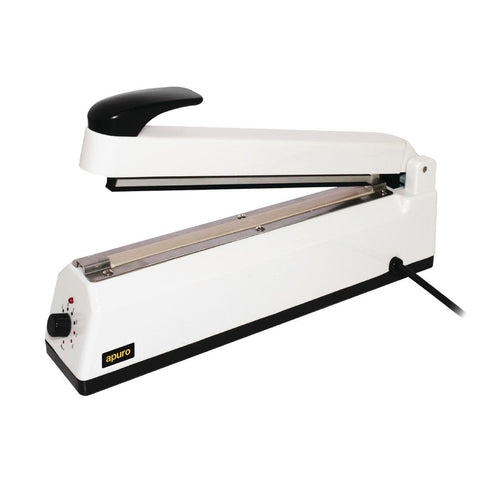
Recently Viewed

 F.E.D Insulated Front Loading Food Pan Carrier IPC90
F.E.D Insulated Front Loading Food Pan Carrier IPC90
460(W) x 660(D) x 630(H)mm


 Vogue Folding Step Stool 2 Tread F018
Vogue Folding Step Stool 2 Tread F018
470(W) x 900(H) x 30(D)mm

 Vogue Clear Polycarbonate 1/4 Gastronorm Tray 100mm U237
Vogue Clear Polycarbonate 1/4 Gastronorm Tray 100mm U237
265(W) x 100(H) x 162(D)mm

 Vogue Clear Polycarbonate 1/4 Gastronorm Tray 150mm U238
Vogue Clear Polycarbonate 1/4 Gastronorm Tray 150mm U238
265(W) x 150(H) x 162(D)mm


 Food Tek 1/3 Gastronorm Pan Lid AUSTRALIAN STYLE - 13000
Food Tek 1/3 Gastronorm Pan Lid AUSTRALIAN STYLE - 13000
325(W) x 176(D) x 8(H)mm

 Food Tek 1/6 x 100 MM Gastronorm Pan AUSTRALIAN STYLE - 16100
Food Tek 1/6 x 100 MM Gastronorm Pan AUSTRALIAN STYLE - 16100
162(W) x 176(D) x 100(H)mm

 Food Tek 1/2 x 65 MM Gastronorm Pan AUSTRALIAN STYLE - 12065
Food Tek 1/2 x 65 MM Gastronorm Pan AUSTRALIAN STYLE - 12065
325(W) x 265(D) x 65(H)mm

 Food Tek 1/3 x 150 MM Gastronorm Pan AUSTRALIAN STYLE - 13150
Food Tek 1/3 x 150 MM Gastronorm Pan AUSTRALIAN STYLE - 13150
325(W) x 176(D) x 150(H)mm

 Food Tek 1/1 x 100 MM Gastronorm Pan AUSTRALIAN STYLE - 11100
Food Tek 1/1 x 100 MM Gastronorm Pan AUSTRALIAN STYLE - 11100
530(W) x 325(D) x 100(H)mm

 Food Tek 1/1 x 65 MM Gastronorm Pan AUSTRALIAN STYLE - 11065
Food Tek 1/1 x 65 MM Gastronorm Pan AUSTRALIAN STYLE - 11065
530(W) x 325(D) x 65(H)mm

 Food Tek 1/9 x 100 MM Gastronorm Pan AUSTRALIAN STYLE - 19100
Food Tek 1/9 x 100 MM Gastronorm Pan AUSTRALIAN STYLE - 19100
108(W) x 176(D) x 100(H)mm

 Food Tek 1/4 x 150 MM Gastronorm Pan AUSTRALIAN STYLE - 14150
Food Tek 1/4 x 150 MM Gastronorm Pan AUSTRALIAN STYLE - 14150
162(W) x 265(D) x 150(H)mm

 Food Tek 1/3 x 65 MM Gastronorm Pan AUSTRALIAN STYLE - 13065
Food Tek 1/3 x 65 MM Gastronorm Pan AUSTRALIAN STYLE - 13065
325(W) x 176(D) x 65(H)mm

 Food Tek 1/2 x 100 MM Gastronorm Pan AUSTRALIAN STYLE - 12100
Food Tek 1/2 x 100 MM Gastronorm Pan AUSTRALIAN STYLE - 12100
325(W) x 265(D) x 100(H)mm

 Food Tek 1/6 Gastronorm Pan Lid AUSTRALIAN STYLE - 16000
Food Tek 1/6 Gastronorm Pan Lid AUSTRALIAN STYLE - 16000
162(W) x 176(D) x 8(H)mm

 Food Tek 1/2 Gastronorm Pan Lid AUSTRALIAN STYLE - 12000
Food Tek 1/2 Gastronorm Pan Lid AUSTRALIAN STYLE - 12000
325(W) x 265(D) x 8(H)mm

 F.E.D 19065 - 1/9 x 65 MM Gastronorm Pan AUSTRALIAN STYLE
F.E.D 19065 - 1/9 x 65 MM Gastronorm Pan AUSTRALIAN STYLE
108(W) x 176(D) x 65(H)mm

 Food Tek 1/4 x 65 MM Gastronorm Pan AUSTRALIAN STYLE - 14065
Food Tek 1/4 x 65 MM Gastronorm Pan AUSTRALIAN STYLE - 14065
162(W) x 265(D) x 65(H)mm

 Food Tek 1/6 x 65 MM Gastronorm Pan AUSTRALIAN STYLE - 16065
Food Tek 1/6 x 65 MM Gastronorm Pan AUSTRALIAN STYLE - 16065
162(W) x 176(D) x 65(H)mm

 Food Tek 1/3 x 100 MM Gastronorm Pan AUSTRALIAN STYLE - 13100
Food Tek 1/3 x 100 MM Gastronorm Pan AUSTRALIAN STYLE - 13100
325(W) x 176(D) x 100(H)mm

 Food Tek 1/2 x 150 MM Gastronorm Pan AUSTRALIAN STYLE - 12150
Food Tek 1/2 x 150 MM Gastronorm Pan AUSTRALIAN STYLE - 12150
325(W) x 265(D) x 150(H)mm

 Food Tek 1/2 x 20 MM Gastronorm Pan AUSTRALIAN STYLE - 12020
Food Tek 1/2 x 20 MM Gastronorm Pan AUSTRALIAN STYLE - 12020
325(W) x 265(D) x 20(H)mm

 Food Tek 1/1 x 150 MM Gastronorm Pan AUSTRALIAN STYLE - 11150
Food Tek 1/1 x 150 MM Gastronorm Pan AUSTRALIAN STYLE - 11150
530(W) x 325(D) x 150(H)mm

 Food Tek 1/9 Gastronorm Pan Lid AUSTRALIAN STYLE -19000
Food Tek 1/9 Gastronorm Pan Lid AUSTRALIAN STYLE -19000
108(W) x 176(D) x 8(H)mm

 Food Tek 1/4 Gastronorm Pan Lid AUSTRALIAN STYLE - 14000
Food Tek 1/4 Gastronorm Pan Lid AUSTRALIAN STYLE - 14000
162(W) x 265(D) x 8(H)mm

 Food Tek 2/3 Gastronorm Pan Lid AUSTRALIAN STYLE - 23000
Food Tek 2/3 Gastronorm Pan Lid AUSTRALIAN STYLE - 23000

 Food Tek 1/1 Gastronorm Pan Lid AUSTRALIAN STYLE - 11000
Food Tek 1/1 Gastronorm Pan Lid AUSTRALIAN STYLE - 11000
530(W) x 325(D) x 8(H)mm

 Food Tek 1/1 x 20 MM Gastronorm Pan AUSTRALIAN STYLE - 11020
Food Tek 1/1 x 20 MM Gastronorm Pan AUSTRALIAN STYLE - 11020
530(W) x 325(D) x 20(H)mm

 Yasaki Electric Salad Spinner W/ Castors & Timer 3Kg/Cycle SP75AS
Yasaki Electric Salad Spinner W/ Castors & Timer 3Kg/Cycle SP75AS
470(W) x 470(D) x 875(H)mm

 Benchstar CPWK090-1 Insulated Front loading Food Carrier
Benchstar CPWK090-1 Insulated Front loading Food Carrier

 Food Tek Australian Perforated GN Pan 1/2 - P12100
Food Tek Australian Perforated GN Pan 1/2 - P12100
325(W) x 265(D) x 100(H)mm




 Food Tek Australian Perforated GN Pan 1/2 - P12065
Food Tek Australian Perforated GN Pan 1/2 - P12065
325(W) x 265(D) x 65(H)mm

 Food Tek Australian Perforated GN Pan 1/1 - P11150
Food Tek Australian Perforated GN Pan 1/1 - P11150
530(W) x 325(D) x 150(H)mm

 Food Tek Australian Perforated GN Pan 1/1 - P11100
Food Tek Australian Perforated GN Pan 1/1 - P11100
530(W) x 325(D) x 100(H)mm

 Food Tek Australian Perforated GN Pan 1/1 - P11065
Food Tek Australian Perforated GN Pan 1/1 - P11065
530(W) x 325(D) x 65(H)mm





 JW-P19HC - 1/9 Gastronorm Pan Poly Lid
JW-P19HC - 1/9 Gastronorm Pan Poly Lid
108(W) x 176(D) x 8(H)mm


 JW-P122 - Clear Poly 1/2 x 65 mm Gastronorm Pan
JW-P122 - Clear Poly 1/2 x 65 mm Gastronorm Pan
325(W) x 265(D) x 65(H)mm


 JW-P132 - Clear Poly 1/3 x 65 mm Gastronorm Pan
JW-P132 - Clear Poly 1/3 x 65 mm Gastronorm Pan
325(W) x 176(D) x 65(H)mm

 JW-P164 - Clear Poly 1/6 x 100 mm Gastronorm Pan
JW-P164 - Clear Poly 1/6 x 100 mm Gastronorm Pan
162(W) x 176(D) x 100(H)mm


 JW-P194 - Clear Poly 1/9 x 100 mm Gastronorm Pan
JW-P194 - Clear Poly 1/9 x 100 mm Gastronorm Pan
108(W) x 176(D) x 100(H)mm

Welcome to Restaurant Equipment Online NZ, your trusted source for all your kitchenware needs. With our professional expertise and Kiwi charm, we are committed to providing you with the highest quality kitchenware for commercial kitchens in New Zealand. From essential tools like knives, pans, and cutting boards to specialized items like mixers, slicers, and ovens, our extensive range covers hundreds of categories to meet the diverse requirements of your restaurant or foodservice establishment. Ordering from us is a breeze, and thanks to our fast and efficient delivery system, you can have your equipment delivered right to your doorstep in no time. Explore our vast collection and equip your kitchen with the best tools available, ensuring efficiency and excellence in your culinary endeavors.
The must-have kitchen tools for any chef include a chef's knife, cutting board, measuring cups and spoons, mixing bowls, pots and pans, a blender, baking sheets, and a good quality non-stick skillet.
Stainless steel cookware is known for its durability, even heat distribution, and non-reactive qualities. On the other hand, non-stick cookware has a coating that prevents food from sticking, making it easier to clean. Both types have their own advantages and are suitable for different cooking techniques.
To keep your kitchen knives in top shape, it's important to hand wash them with mild soap and warm water, then dry them immediately. Avoid using abrasive materials or placing them in the dishwasher, as it can damage the blade. Regularly sharpening and honing your knives will also help maintain their performance.
Wood and plastic cutting boards are both popular choices. Wood boards are gentle on knife blades, while plastic boards are easy to clean and sanitize. Regardless of the material you choose, make sure to clean and dry the board thoroughly after each use to prevent bacteria growth.
Pot and pan sizes depend on the type of cooking you do and the number of people you typically cook for. A versatile set usually includes a small saucepan, medium-sized sauté pan, and a large stockpot. It's always better to have a few different sizes to accommodate various recipes.
It is generally not recommended to use metal utensils on non-stick cookware, as they can scratch and damage the non-stick coating. Opt for silicone, wood, or nylon utensils that are safe to use with non-stick surfaces.
Yes, cast iron pans are compatible with all stovetops, including gas, electric, and induction. Just make sure to properly season the pan before using it to ensure optimal non-stick properties.
High-performance blenders are capable of blending tough ingredients, making them ideal for smoothies, soups, and sauces. They are designed to pulverize ingredients into a smooth consistency, allowing for more versatility in the kitchen.
To prevent warping, avoid sudden temperature changes. Allow your baking sheets to cool completely before immersing them in water, and never place a hot sheet directly on a cold surface. Additionally, choose thicker, heavier sheets that are less prone to warping.
It's recommended to use protective gloves or special heat-resistant mitts when handling cast iron cookware, as they can retain and transfer heat more than other types of cookware. Standard fabric oven mitts may not provide sufficient insulation.